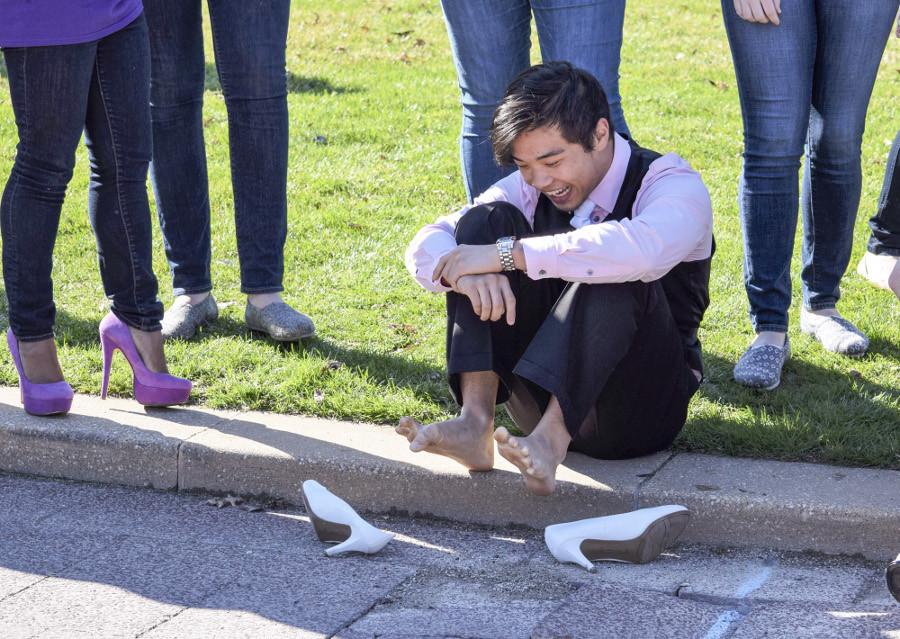Walk KSL Oval in her shoes
One participant in Sigma Psi and Alpha Chi Omega’s Walk a Mile in Her Shoes event found that “her shoes” were less than comfortable.
With music blasting and people dancing, the third annual Walk a Mile in Her Shoes philanthropy event felt more like a party than anything else. Last year those who registered simply walked a mile in high heels, but this year Sigma Psi and Alpha Chi Omega changed it up by raising awareness of domestic violence and sexual assault with a joint-sponsored high-heeled relay race.
Teams of five competed to see who could run the fastest circle around Kelvin Smith Library Oval, with Phi Delta Theta coming in first. They were followed by Phi Kappa Psi in second and Zeta Psi in third. The event’s Spirit Award went to Delta Tau Delta.
Between races, students decked out in purple t-shirts and face-paint milled around, salsa-dancing and playing cornhole. The Case Men’s Glee Club performed their own rendition of “Hooked on a Feeling,” and Spartan Cheer did a routine.
The event raised $1,500 for Sigma Psi’s and Alpha Chi Omega’s philanthropies.
Despite the jovial atmosphere, this event dealt with a serious issue. The spring counterpart to Alpha Chi Omega’s Domestic Violence Awareness Week, the annual Walk a Mile in Her Shoes event is designed to recognize and raise awareness of survivors of domestic violence and sexual assault.
Appropriately, the two sororities sponsoring the event this year—Alpha Chi Omega and Sigma Psi—focus on philanthropies dealing with sexual assault and domestic violence, respectively.
This year the event was preceded by a week-long bake sale. This was accompanied by a mini enactment of The Clothesline Project, where students wrote supportive messages to survivors of domestic violence or sexual assault on paper t-shirts as they passed through Nord Hall.
According to Emily Serfling, president of Alpha Chi Omega, the most important thing about these events is spreading awareness.
“This is an ‘everyone’ issue,” she said. “A lot of people…have a tendency to distance themselves from this, because it’s uncomfortable to look at people’s relationships and how they can be unhealthy and hurting them. I think the most important part of this is that we a make a difference and that every single person here is making a difference. It’s not just an issue between, you know, these two people…it’s between our entire community.”
Shenali Warnakulasuriya, the public relations chair for Alpha Chi Omega, agrees.
“We would love to make money for both of the shelters we’re donating our money to,” she said. “It’s a lot about awareness, because in a college campus, it’s unfortunate, but there are so many instances [of sexual assault and domestic violence]. So I think it’s important that we have events like this to encourage people to speak out.”
The most important thing for people to know is, according to Warnakulasuriya, is that “there are people supporting [survivors].”
For the women of Alpha Chi Omega and Sigma Psi, the most memorable moments in their advocacy of this issue have come during the Sexual Assault and Violence Educator’s (SAVE) annual Take Back the Night dinner, as well as their Voices Against Violence event, where survivors of domestic violence and sexual assault share their stories with campus supporters.
“Just seeing all these people go up and share their stories, some people who I see every day, but I never knew they were affected by any forms of domestic violence or sexual assault, just made me think they trust us that much,” Warnakulasuriya said.
Rachael Becker, president of Sigma Psi, emphasized the importance of these kinds of events.
“I think it’s really easy to say ‘not in my backyard,’ especially when it comes to sexual misconduct in a college setting or [ignoring] what is and isn’t sexual misconduct,” she said. “I think that those kinds of events really help to bring to light the number of people that it affects who are, like, your friends. They’re someone who lives on your floor, they’re that person who sits next to you in a class.”
Khaliah Fisher-Grace, a hotline advocate for the Cleveland Rape Crisis Center, also attended the event, braving the wind to hand out fliers and informational pamphlets. Fisher-Grace has been answering the 24-hour Cleveland Rape Crisis Center Hotline for three years now, talking to women and men who are sometimes survivors of domestic violence, sometimes survivors of sexual assault and sometimes, the families of survivors. All, however, are looking for support.
“You may have spent 25 minutes on the phone with them, 45 minutes on the phone with them, just trying to help calm them down, work through, just provide them with exercises to help them relax, help them focus…or just be there to just listen to them cry,” Fisher-Grace said. “And the biggest reward they can say is ‘thank you.’”
“In college, and in situations like this, it’s so easy to feel alone and that you have nobody,” said Warnakulasuriya. “But just knowing that these two groups of women are behind you, supporting you and encouraging you to speak out…To whoever’s been affected by any form of violence or sexual assault, just know that there are some people behind you and supporting you, and don’t ever feel alone.”


